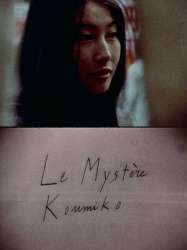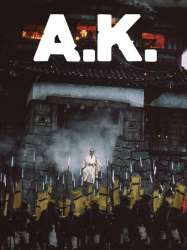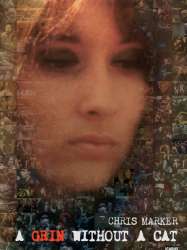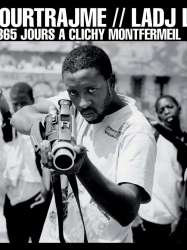The Lovely Month of May is a french film of genre Documentary directed by Chris Marker released in USA on 13 september 2013 with Chris Marker
The Lovely Month of May (1963)

If you like this film, let us know!
Released in USA 13 september 2013
Length 2h36
Directed by Chris Marker
OriginFrance
Genres Documentary
Themes La banlieue française
Rating77%










Le Joli Mai is a 1963 French documentary film by Chris Marker and Pierre Lhomme.
Beginning in the Spring of 1962, just after the close of the Algerian War and the Évian Accords, Marker and his camera operator Pierre Lhomme shot 55 hours of footage interviewing random people on the streets of Paris.
The questions, asked by the unseen Marker, range from their personal lives, as well as social and political issues of relevance at that time. As he had with montages of landscapes and indigenous art, Marker created a film essay that contrasts and juxtaposes a variety of lives with his signature commentary (spoken by Marker's friends, singer-actor Yves Montand in the French version and Simone Signoret in the English version). The film has been compared to the cinéma vérité films of Jean Rouch, and criticized by its practitioners at the time. It was shown in competition at the 1963 Venice Film Festival, where it won the award for Best First Work. It also won the Golden Dove Award at the Leipzig DOK Festival.
While making Le Joli Mai, Marker was simultaneously making the 1962 science fiction short La Jetee.
It was shown as part of the Cannes Classics section of the 2013 Cannes Film Festival.
^ Di Iorio, Sam. "Chris Marker: The Truth About Paris". Film Comment. Retrieved 26 May 2013.
^ Wakeman, John. World Film Directors, Volume 2. The H. W. Wilson Company. 1988. 649–654.
^ "Cannes Classics 2013 line-up unveiled". Screen Daily. Retrieved 2013-04-30.
Synopsis
Un mois dans une ville, mai 1962, Paris filmé au plus près du pavé et des visages par Chris Marker et son équipe. « En ce premier mois de paix depuis sept ans », car la guerre d'Algérie s'achève avec les accords d'Évian, que font, à quoi pensent les Parisiens ? La guerre et la politique ? On évite d'en parler, l'interviewer s'en étonne même : les Français qui aimaient tant discuter seraient-ils muets ?Actors

Chris Marker
(Self / Interviewer (voice))

Yves Montand
(Narrator (French version) (voice))

Simone Signoret
(Narrator (English version) (voice))

Jean-Luc Godard
(Self (uncredited))

Anna Karina
(Self (uncredited))
Comments
Leave comment :
Suggestions of similar film to The Lovely Month of May
There are 197 films with the same actors, 24 films with the same director, 8968 with the same cinematographic genres, 107 films with the same themes, to have finally 70 suggestions of similar films.If you liked The Lovely Month of May, you will probably like those similar films :

Far from Vietnam (1967)
, 1h56Directed by Claude Lelouch, Chris Marker, Alain Resnais, Joris Ivens, Jean-Luc Godard, Agnès Varda, William Klein
Origin France
Genres Drama, War, Documentary
Themes French war films, Politique, Documentary films about war, Documentary films about historical events, Political films
Actors Bernard Fresson, Karen Blanguernon, Jean-Luc Godard, Maurice Garrel, Marie-France Mignal, Agnès Varda
Rating72%





Sept façons différentes de présenter les armées nord-vietnamiennes en pleine guerre contre les Etats-Unis. Un conflit opposant les riches aux pauvres sur fond d'indignation ou parfois d'indifférence de la part de l'opinion publique mondiale.

Level Five (1997)
, 1h46Directed by Chris Marker
Origin France
Genres Science fiction, War, Documentary, Romance
Themes Films about computing, Jeu, Documentary films about war, Documentary films about historical events, Films about video games, Cyberpunk films, Anticipation
Actors Catherine Belkhodja, Chris Marker, Nagisa Ōshima
Rating69%





Kenji Tokitsu, expert en sports de combat et auteur de la Voix du do, et Nagisa Oshima, cinéaste, sont interviewés. (partie documentaire du film).
 , 1h
, 1hDirected by Chris Marker
Genres Documentary
Actors Yves Montand
Rating69%





En février 1974, Yves Montand décide de chanter un soir à l’Olympia pour les réfugiés chiliens en France. Il n’est pas remonté sur scène depuis 1968 et n’a que douze jours pour se préparer. Il s’installe alors dans sa maison d’Auteuil avec son pianiste et compère de trente ans Bob Castella.

The Koumiko Mystery (1965)
, 46minutesDirected by Chris Marker
Origin France
Genres Documentary
Actors Chris Marker
Rating75%





Alors qu'il est au japon pour documenter les jeux d'été 1964 à Tokyo, Chris Marker rencontre Koumiko Muraoka. Intrigué et fasciné par la jeune femme, il décide de lui consacrer un film qu'il ouvre en ces termes:« Koumiko Murooka, secrétaire, plus de vingt ans, moins de trente, née en Mandchourie, aimant Giraudoux, détestant le mensonge, élève de l'Institut franco-japonais, aimant Truffaut, détestant les machines électriques et les Français trop galants, rencontrée par hasard à Tokyo, pendant les Jeux olympiques. Autour d'elle, le Japon.

A.K. (1985)
, 1h15Directed by Chris Marker
Origin France
Genres Documentary
Themes Documentary films about business, Documentary films about the film industry, Documentaire sur une personnalité
Actors Akira Kurosawa, Shigehiko Hasumi, Chris Marker, Tatsuya Nakadai, Ishirō Honda
Rating69%





Sur les pentes du Mont Fuji, un dieu dirige le "Chaos". Il s'agit d'Akira Kurosawa et de son dernier film. Chris Marker, specialiste du Japon, l'a accompagne durant le tournage.Il nous permet d'assister a la naissance de l'oeuvre d'un maitre du 7e art.

A Grin Without a Cat (1977)
, 4hDirected by Chris Marker
Origin France
Genres War, Documentary, Historical
Themes Politique, Documentary films about politics, Political films
Actors Yves Montand, François Périer, Jorge Semprún, Simone Signoret
Rating78%





The film features many interviews with French communist leaders, students, and sociologists. The Prague Spring of 1968 is featured, with footage of a Fidel Castro speech in which he explains his political support for the Soviet invasion of Czechoslovakia while questioning the legality of the action. Other sections deal with the rise of Salvador Allende, Minamata poisoning in Japan, and the Watergate Scandal in the US. There are many subtle references to cats throughout the film, as well as brief shots of raccoons.
 , 1h57
, 1h57Directed by Jean-Patrick Lebel
Origin France
Genres Documentary
Themes La banlieue française
Des jeunes d'origine algérienne et marocaine vivant dans une cité d'Aulnay-sous-Bois racontent leurs « galères ».

Genres Documentary
Themes La banlieue française
Rating59%





"Après la mort de Zyed et Bouma j'ai filmé ma ville, le grand ensemble Clichy Montfermeil pendant plus d'un an. 54 000 habitants à 12 kilomètres de Paris, Seine-Saint-Denis (93). 40% de chômage, 33% d'immigrés, 40% de la population ont moins de 20 ans"

The Cat (1971)
, 1h26Directed by Pierre Granier-Deferre, Dominik Graf
Origin France
Genres Drama
Themes Films about animals, La banlieue française, Films about suicide, Vieillesse, Films about cats, Mise en scène d'un mammifère
Actors Jean Gabin, Simone Signoret, Annie Cordy, Harry-Max, Jacques Rispal, Nicole Desailly
Rating74%





Un couple de retraités, les Bouin, habite en banlieue parisienne (à Courbevoie) dans les années 1970, en plein bouleversement du fait des travaux d'urbanisme moderne d'alors. Julien Bouin est un ancien ouvrier typographe ; sa femme, Clémence Bouin, est une ancienne trapéziste de cirque dont la carrière s'est terminée trop tôt en raison d'une chute lors d'un spectacle. Ils n'ont jamais eu d'enfants.

The Embassy (1973)
, 20minutesDirected by Chris Marker
Origin France
Genres Drama
Actors Chris Marker
Rating70%





Le film dure vingt minutes et le spectateur suppose qu'il se passe dans une ambassade située dans une grande ville d'Amérique du Sud, après un coup d'État (probablement le Chili après le coup d'État du Général Augusto Pinochet). La caméra reste dans l'ambassade et filme la vie au jour le jour des réfugiés, de l'ambassadeur et de sa femme qui les accueillent.
 Connection
Connection